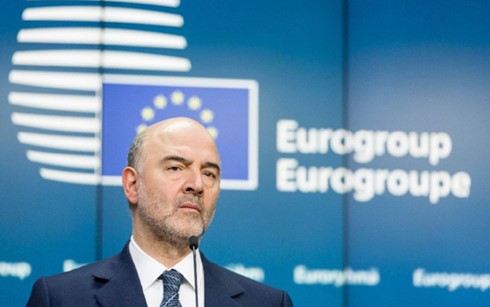(VOVworld)- After the Panama Papers Scandal, countries around the world are intensifying the fight against tax avoidance. The European Commission recently adopted a series of measures, including requesting financial transparency from companies.
 |
| European Commissioner Pierre Moscovici (Photo: AFP) |
The European Commission (EC) submitted to the European Parliament (EP) measures to prevent multinational companies from tax avoidance on Tuesday in Strasbourg, France. The EC, the executive body, has ordered member countries to publicize accounting and tax data on revenues, profits and the ceiling level of tax that multinational companies have to pay. Under the EC's new proposal, if a multinational group, no matter what country it is from, earns a profit of more than 750 million Euros, it should announce accounting information including revenues and profits. Tax should be paid in the particular country where the profits are made. All these data will be automatically shared by tax agencies of EU member countries. A wide range of multinational companies like Amazon, Google, Facebook, Coca-cola have to present the European Parliament with their opinions on the EC's proposal.
The measures were prepared long ago by two commissioners namely Pierre Moscovici in charge of tax affairs and Jonathan Hill for financial stability, to prevent groups from basing and filing tax returns in countries that have lax or low tax systems. Earlier, commissioner Moscovici voiced his anger over the tax avoidance information leaks in the Panama Papers scandal, describing it an evil of the world.
In Europe, tax evasion and fraud are estimated to amount to billions of USD in state budget loss each year. As the Panama Papers' leaks continue to shock the world, the EC has pledged to formulate a black list of tax havens as soon as possible. Previously, only 8 EU countries were blacklisted and recently France was added to the list.
The latest EU measures are parts of the bloc’s efforts to stamp out tax frauds, following the LuxLeal tax evasion details revealed in November 2014. In January of this year, the EC issued 2 directives to curb tax avoidance schemes by multinational companies. The first directive is expected to boost the automatic exchange of information on enterprise financial activities between tax agencies within the EU. The second directive relates to checks of profit tax in the country where the profit is generated.
While the anti tax avoidance packages receive applause and positive feedback from economists, who praised the EU as the leading the fight, trade activists complain that the coercion of companies to release sensitive data may slow investment flow into Europe. It’s still unclear whether the new measures are able to root out tax avoidance or not. But certainly, multinational groups have to readjust their financial operations, making it more transparent.